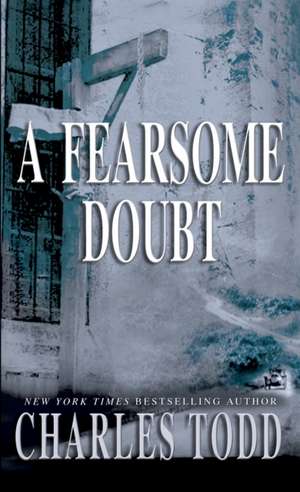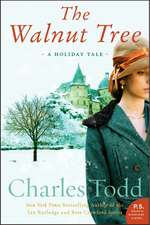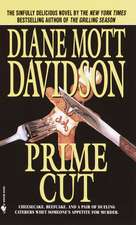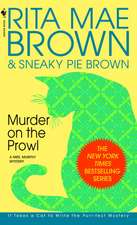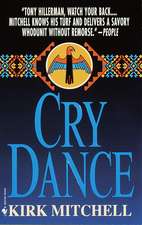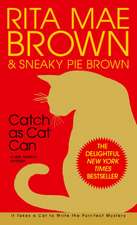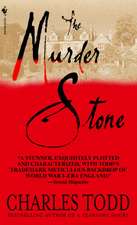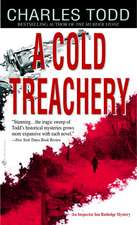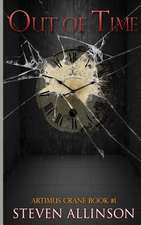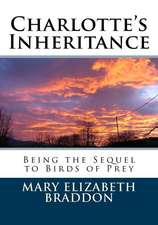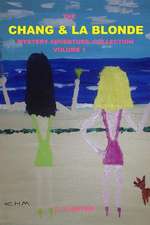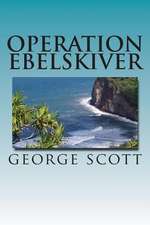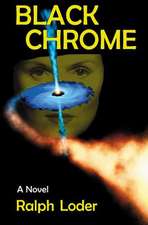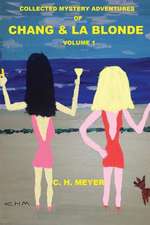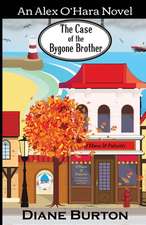A Fearsome Doubt: Inspector Ian Rutledge Mysteries
Autor Charles Todden Limba Engleză Paperback – 30 iun 2003
A Fearsome Doubt
In 1912 Ian Rutledge watched as a man was condemned to hang for the murders of elderly women. Rutledge helped gather the evidence that sent Ben Shaw to the gallows. And when justice was done, Rutledge closed the door on the case. But Shaw was not easily forgotten.
Now, seven years later, that grim trial returns in the form of Ben Shaw’s widow Nell, bringing Rutledge evidence she is convinced will prove her husband’s innocence. It’s a belief fraught with peril, threatening both Rutledge’s professional stature and his faith in his judgment. But there is a darker reason for Rutledge’s reluctance. Murder brings him back to Kent where, days earlier, he’d glimpsed an all-too-familiar face beyond the leaping flames of a bonfire. Soon an unexpected encounter revives the end of his own war, as the country prepares for a somber commemoration on the anniversary of the Armistice. To battle the unsettled past and the haunted present at the same time is an appalling mandate.
And the people around him? among them the attractive widow of a friend, a remarkable woman who survived the Great Indian Mutiny; a bitter, dying barrister; and a man whose name he never knew—unwittingly compete with the grieving Nell Shaw. They’ll demand more than Rutledge can give, unaware that he is already carrying the burden of shell shock? and the voice of Hamish MacLeod, the soldier he was forced to execute in the war. The killer in Marling is surprisingly adept at escaping detection. And Ben Shaw’s past is a tangle of unsettling secrets that may or may not be true. Rutledge must walk a tortuous line between two murderers...one reaching out to ruin him, the other driven to destroy him.
From the Hardcover edition.
Din seria Inspector Ian Rutledge Mysteries
-
 Preț: 51.10 lei
Preț: 51.10 lei -
 Preț: 96.24 lei
Preț: 96.24 lei -
 Preț: 103.26 lei
Preț: 103.26 lei -
 Preț: 107.02 lei
Preț: 107.02 lei -
 Preț: 77.07 lei
Preț: 77.07 lei -
 Preț: 97.52 lei
Preț: 97.52 lei -
 Preț: 111.46 lei
Preț: 111.46 lei -
 Preț: 106.14 lei
Preț: 106.14 lei -
 Preț: 93.18 lei
Preț: 93.18 lei -
 Preț: 155.24 lei
Preț: 155.24 lei -
 Preț: 101.86 lei
Preț: 101.86 lei -
 Preț: 113.51 lei
Preț: 113.51 lei -
 Preț: 112.47 lei
Preț: 112.47 lei -
 Preț: 75.80 lei
Preț: 75.80 lei -
 Preț: 112.47 lei
Preț: 112.47 lei -
 Preț: 63.32 lei
Preț: 63.32 lei -
 Preț: 101.40 lei
Preț: 101.40 lei -
 Preț: 82.47 lei
Preț: 82.47 lei -
 Preț: 108.22 lei
Preț: 108.22 lei
Preț: 48.89 lei
Nou
Puncte Express: 73
Preț estimativ în valută:
9.36€ • 10.16$ • 7.86£
9.36€ • 10.16$ • 7.86£
Carte disponibilă
Livrare economică 02-16 aprilie
Preluare comenzi: 021 569.72.76
Specificații
ISBN-13: 9780553583175
ISBN-10: 0553583174
Pagini: 356
Dimensiuni: 162 x 175 x 27 mm
Greutate: 0.19 kg
Editura: Bantam Books
Seria Inspector Ian Rutledge Mysteries
ISBN-10: 0553583174
Pagini: 356
Dimensiuni: 162 x 175 x 27 mm
Greutate: 0.19 kg
Editura: Bantam Books
Seria Inspector Ian Rutledge Mysteries
Notă biografică
Charles Todd is the author of Watchers of Time, Legacy of the Dead, A Test of Wills, Wings of Fire, and Search the Dark. He lives on the East Coast, where he is at work on the next novel in the Inspector Ian Rutledge series, A Cold Treachery.
From the Hardcover edition.
From the Hardcover edition.
Extras
AUGUST 1912
LONDON
The prisoner was standing in the dock, face strained, eyes on the foreman of the jury. His fingers gripped the wooden railing, white-knuckled, as he tried to hear the portly, gray-haired man in the jurors' box reading the verdict. But the roaring in his ears as his heart pounded hard enough to suffocate him seemed to shut out the words. He swallowed hard, then leaned forward a little, concentrating on the juror's lips.
"--guilty on all charges--"
The foreman's voice rose on the last four words, as if he found them distasteful, his glance furtively flicking toward the accused and away again. A greengrocer, he was not sympathetic to theft and murder.
The prisoner's face swung toward the judge as he lifted the black silk square and settled it neatly on his heavy white wig, prepared to pass sentence.
". . . taken from this place . . . hung by the neck . . ."
The prisoner blanched, and turned in anguish toward his wife, seated in the gallery watching, her gloved hands clenched tightly in her lap.
But she offered no comfort, staring straight ahead. Her face was closed and empty. He couldn't look away. His sister, on the far side of his wife, was weeping into her handkerchief, hunched into her grief, but he hardly noticed. It was his wife's coldness that riveted him.
He thought, "She believes it now--"
Inspector Ian Rutledge, the young officer from the Yard whose evidence had all but placed the rope around Ben Shaw's throat, turned away and quietly left the courtroom.
He did not enjoy sending any man to his death. Even this one, whose crimes had shocked London. At such a time he was always mindful of his father, a solicitor, who had held strong views on the subject of hanging.
"I don't believe in it. Still, the dead had no choice in their dying, did they? The murderer did. It's on his own head, what becomes of him. He knew from the start what justice would be meted out to him. But he always expects to avoid it, doesn't he? There's an arrogance in that which disturbs me more than anything else--"
Ben Shaw hadn't been arrogant. Murder hadn't set well on his conscience. Hanging might come as a relief, an end to nightmares. Who could say?
Certainly not Rutledge himself--he had never taken a life. Would that alter his view of murder, would it in any way change his ability to understand a crime, or his attitude toward the killer? He thought not. It was the victim who had always called out to him, the voiceless dead, so often forgotten in the tumultuous courtroom battle of guilt versus innocence.
It was said that Justice prevented Anarchy. Law established Order.
Cold comfort to the elderly women Ben Shaw had strangled in their beds.
Still, the silenced victims had not gone unheard in this courtroom. . . .
5 NOVEMBER, 1919
MARLING, KENT
The bonfire had been piled high with the debris from a dozen gardens and enough twigs and dead boughs to outlast the Guy. The celebrants were gathered about the square, talking and laughing as if the gruesome spectacle they were about to witness was far more exciting than frightening. The match had yet to be tossed into the pyre, but two men in flowing wigs and faded satin coats awaited the signal. Their sober faces were flushed with wine and duty. The taller leaned toward his companion and said in a low voice, "All this hair itches like the very devil!"
"Yes, well, at least your shirt fits! This lace will end up strangling me, wait and see! I'm ready to kill whoever thought up this charade."
"Won't be long now."
It was the close of Guy Fawkes Day, and tonight the stuffed effigy of a traitor was about to be paraded around the village square and then thrown into the flames.
Bonfires were a long-standing English tradition, marking the Gunpowder Plot of 1605 when the real Guy Fawkes had been caught with his coconspirators attempting to blow up the Houses of Parliament and King James with them.
A macabre way of reminding schoolchildren, as they went round their villages and towns collecting pennies to buy Roman candles, what becomes of traitors.
As a rule it was a family affair, held in the back garden, the fire as fat or sparse as the family could manage, the Guy dressed in cast-off clothes stuffed with straw. In too many households during four and a half years of war the celebration had dwindled to a token affair; the dearth of able-bodied men and the hardships of families struggling to survive without them made the effort increasingly a burden. The village of Marling had decided to revive the custom with a public flourish.
Ian Rutledge had given his share of pennies to the local children this morning, while Hamish, in his head, disparaged the whole affair. "It's no' a Scottish tradition, to waste guid firewood. It's too hard to come by."
Remembering the barren, stone-scarred mountains where Hamish had grown up, Rutledge said, "When in Rome . . ."
"If ye came for Hogmanay, now, a good fire on the hearth was hospitality after a long ride in the cold."
Rutledge knew the Scottish holiday, the last day of the year, when the children demanded gift cakes and the whisky flowed freely--and not necessarily whisky upon which any tax had been paid. He had commanded Scottish troops in the war, and they had brought their traditions as well as their traditional courage with them. He had turned a blind eye on more than one occasion, the policeman subverted by the compassion he felt for his homesick men--many little more than boys--trying to forget how short their lives were destined to be by remembering home.
Tonight, 5 November, he wasn't on duty in London; he was standing among the revelers in an attractive village high on the Downs, and beside him was the widow of a friend who had died in the Great War. She had invited him to come down for the occasion. "You must, Ian! It will do both of us a world of good. It's time to put the war behind us, and try to rebuild our lives. . . ."
He had no life to rebuild, but she did, and Frances, his sister, had urged him to accept the invitation. "Elizabeth has mourned for two years. It won't bring Richard back, will it? I think we should encourage her, if she's ready to shut the door on all that. And it will do you good as well, to see more of old friends. You've buried yourself in your work for months now!" The last accusing. And then Frances had added, hastily, "No, I'm not matchmaking. She would do as much for either of us, if we were in need, and you know that as well as I do."
It was true. Elizabeth was one of the most generous people Rutledge knew. Richard Mayhew had been very fortunate in his choice of wife.
She was a slim woman in her late twenties, with sparkling dark eyes and a wry sense of humor. Her presence was brightness and warmth and a belief that life could be good. It was--almost--contagious.
And just now, he was in need of warmth and brightness, to chase away other shadows. . . .
Clinging to his arm in the press of people, Elizabeth was saying, "Richard loved all this, you know. He loved tradition and the . . ."
Rutledge lost the thread of her words as the Guy, flamboyant in dress and hanging from a long pole, was brought into the square and carried triumphantly around the unlit fire. A deafening shout of approval rose, and as Rutledge glimpsed the painted mockery of a face, its wild eyes and flaring nostrils, the grinning mouth, the bits of someone's wig straggling about the ears, he had to laugh. What was lost in talent had been made up in exuberance.
"Aye, exuberance," Hamish agreed, "with a wee touch of Auld Clootie . . ."
The Devil. Only a Scot with generations of Covenanters in his family tree would make such a comparison.
Rutledge responded silently, "The first James was your king as well as ours. Or have you forgotten?"
Hamish, considering the matter, replied, "We didna' care o'ermuch for him."
The Guy was closer now, dancing a jig on the pole, and Elizabeth was laughing like a girl. "Oh, Ian, look, he's wearing those masquerade clothes I found in the attics and donated to the committee. Wouldn't Richard have been delighted--"
On the far side of the crowd, someone had lit the fire, and the flames began to fly through the dry brush, reaching for the harder wood. Applause greeted them. In the garish light, the Guy took on a realistic life of its own, the straw-stuffed limbs jerking in time with the booted feet of its minders as it was paraded before an appreciative audience. Shouts of approval and the word "Traitor!" mingled with laughing cries of "Into the flames with him!" and "God Save King James and Parliament." The shrill, giggling voices of children taunted the Guy, a counterpoint to parents warning their offspring not to venture too close to the fire: "Mind now!" or "Stand clear, do!"
And in the light of the flames, lit just as garishly as the Guy, was a face that Rutledge's gaze passed over--and returned to--and recognized--
But from where?
He went cold with a sense of shock he couldn't explain. A knowledge that was there, buried deep in the brain, concealed by layers of denial and blank horror. And yet rising to the surface with the full force of his being was a single realization--He didn't want to know the answer--
There was danger in searching for the answer--
He stood motionless, his body rigid, his arm stiffening in Elizabeth's grip. But she was entranced by the spectacle, and unaware. He was physically caught up in his surroundings, the voices of people on every side of him, the heavy smell of smoke as the wind blew it his way, the warmth of Elizabeth's hands on him, the coolness of the night air, the rough feel of the wool coat across his shoulders, the shadowed brick facades looming above him--and at the same time, emotionally, he was firmly locked in a private hell that mirrored the flames rising into the black sky above. As the seconds passed, it seemed for a fraction of an instant that the eyes of his enemy sought and found his before moving on. The odd light lent them a ferocity that stunned him.
As if acknowledging a connection between them, a connection built on--what?
And how did he know this was an enemy?
"Gentle God," Rutledge whispered under his breath--and then the face vanished, a will-o'-the-wisp in the November night, a figment of murky imagination lost in the smoke. Suddenly he doubted his own senses.
He had seen it--Dear God, surely he had seen it!
Or--had it been no more than a fleeting memory from the last days of the war--a moment's aberration, a flash of something best buried in the dim reaches of his mind, best unresurrected?
In this past week uneasy memories had surfaced and disappeared with disconcerting irregularity, as if the approaching anniversary of the Armistice had jarred them into life again. Rutledge was not the only soldier who was experiencing this phenomenon--he'd heard two constables who had survived the trenches warily questioning each other about lapses in concentration. And several men in a pub dancing uneasily around who was sleeping well and who wasn't. There had been the officer sitting on a bench by the Embankment, staring at the river water with such obsessive fascination that Rutledge had stopped and spoken to him. The man had traveled a long way back to the present, and looked up at Rutledge as though wanting to ask, "Were you there?" And saying instead, "The water's bitter cold and gray today, isn't it?" It was almost a confession that drowning had been on his mind.
As if uncertain, all of them, whether or not they were going mad, and grateful to discover they were not alone in their fears. As if that made it more tolerable, not being alone. . . .
Just this need had sent him down to Kent.
He found himself searching among the villagers gathered in a ring around the fire's blazing gold and red light, but the face he sought was no longer there. Not now.
Not ever?
Hamish, alarmed and accusing in the back of his mind, was exclaiming, "It canna' be. Ye've gone o'wer the edge, man!"
Badly shaken, Rutledge had lost sight of the perambulating Guy, making a lap on the far side of the bonfire. Now the grotesque effigy was coming round once more, a final circuit while the lengths of harder wood smoked and began to burn hot enough to consume the fire's prey.
Over by the bronze statue of a mounted cavalier that stood at the point of the square where the main road curved away from the High Street, there was hilarity as a police sergeant gathered older boys around him and gave his orders. The bronze cavalier's back was turned on the antics of his descendants, his face haughty and withdrawn under the brim of his plumed hat, the aristocratic arch of his nose and the smooth sweep of his cheekbones highlighted by the fire's blaze.
As the first Roman candles went streaming noisily skyward from the cluster of children, Rutledge flinched. At the Front, flares had been used to test the wind--
The crack! and the rat-a-tat-tat of the smaller charges sent his heart rate soaring. He felt exposed, caught out in the open, as the sounds of war surrounded him again. His immediate inclination was to shout orders to his men, to bend into the run that would carry him across No Man's Land--
Elizabeth, suddenly aware, looked up at the tension in his face and cried, "Oh--I didn't think--are you all right? It's only the children--"
Rutledge nodded, unable to trust his voice.
Just then the Guy went sailing into the heart of the blaze, like a living creature struggling to escape as the heat rushed toward him. The onlookers were ecstatic, roaring at the top of their lungs as the straw-stuffed figure jerked and twisted as if in torment. The candles streamed wildly above the tongues of flame, and the noise was deafening.
Rutledge was still scouring the faces illuminated by the flames. A policeman was trained to observe, to remember the shape of a nose, the width of a mouth, the way the eyes were set and the height of the forehead.
From the Hardcover edition.
LONDON
The prisoner was standing in the dock, face strained, eyes on the foreman of the jury. His fingers gripped the wooden railing, white-knuckled, as he tried to hear the portly, gray-haired man in the jurors' box reading the verdict. But the roaring in his ears as his heart pounded hard enough to suffocate him seemed to shut out the words. He swallowed hard, then leaned forward a little, concentrating on the juror's lips.
"--guilty on all charges--"
The foreman's voice rose on the last four words, as if he found them distasteful, his glance furtively flicking toward the accused and away again. A greengrocer, he was not sympathetic to theft and murder.
The prisoner's face swung toward the judge as he lifted the black silk square and settled it neatly on his heavy white wig, prepared to pass sentence.
". . . taken from this place . . . hung by the neck . . ."
The prisoner blanched, and turned in anguish toward his wife, seated in the gallery watching, her gloved hands clenched tightly in her lap.
But she offered no comfort, staring straight ahead. Her face was closed and empty. He couldn't look away. His sister, on the far side of his wife, was weeping into her handkerchief, hunched into her grief, but he hardly noticed. It was his wife's coldness that riveted him.
He thought, "She believes it now--"
Inspector Ian Rutledge, the young officer from the Yard whose evidence had all but placed the rope around Ben Shaw's throat, turned away and quietly left the courtroom.
He did not enjoy sending any man to his death. Even this one, whose crimes had shocked London. At such a time he was always mindful of his father, a solicitor, who had held strong views on the subject of hanging.
"I don't believe in it. Still, the dead had no choice in their dying, did they? The murderer did. It's on his own head, what becomes of him. He knew from the start what justice would be meted out to him. But he always expects to avoid it, doesn't he? There's an arrogance in that which disturbs me more than anything else--"
Ben Shaw hadn't been arrogant. Murder hadn't set well on his conscience. Hanging might come as a relief, an end to nightmares. Who could say?
Certainly not Rutledge himself--he had never taken a life. Would that alter his view of murder, would it in any way change his ability to understand a crime, or his attitude toward the killer? He thought not. It was the victim who had always called out to him, the voiceless dead, so often forgotten in the tumultuous courtroom battle of guilt versus innocence.
It was said that Justice prevented Anarchy. Law established Order.
Cold comfort to the elderly women Ben Shaw had strangled in their beds.
Still, the silenced victims had not gone unheard in this courtroom. . . .
5 NOVEMBER, 1919
MARLING, KENT
The bonfire had been piled high with the debris from a dozen gardens and enough twigs and dead boughs to outlast the Guy. The celebrants were gathered about the square, talking and laughing as if the gruesome spectacle they were about to witness was far more exciting than frightening. The match had yet to be tossed into the pyre, but two men in flowing wigs and faded satin coats awaited the signal. Their sober faces were flushed with wine and duty. The taller leaned toward his companion and said in a low voice, "All this hair itches like the very devil!"
"Yes, well, at least your shirt fits! This lace will end up strangling me, wait and see! I'm ready to kill whoever thought up this charade."
"Won't be long now."
It was the close of Guy Fawkes Day, and tonight the stuffed effigy of a traitor was about to be paraded around the village square and then thrown into the flames.
Bonfires were a long-standing English tradition, marking the Gunpowder Plot of 1605 when the real Guy Fawkes had been caught with his coconspirators attempting to blow up the Houses of Parliament and King James with them.
A macabre way of reminding schoolchildren, as they went round their villages and towns collecting pennies to buy Roman candles, what becomes of traitors.
As a rule it was a family affair, held in the back garden, the fire as fat or sparse as the family could manage, the Guy dressed in cast-off clothes stuffed with straw. In too many households during four and a half years of war the celebration had dwindled to a token affair; the dearth of able-bodied men and the hardships of families struggling to survive without them made the effort increasingly a burden. The village of Marling had decided to revive the custom with a public flourish.
Ian Rutledge had given his share of pennies to the local children this morning, while Hamish, in his head, disparaged the whole affair. "It's no' a Scottish tradition, to waste guid firewood. It's too hard to come by."
Remembering the barren, stone-scarred mountains where Hamish had grown up, Rutledge said, "When in Rome . . ."
"If ye came for Hogmanay, now, a good fire on the hearth was hospitality after a long ride in the cold."
Rutledge knew the Scottish holiday, the last day of the year, when the children demanded gift cakes and the whisky flowed freely--and not necessarily whisky upon which any tax had been paid. He had commanded Scottish troops in the war, and they had brought their traditions as well as their traditional courage with them. He had turned a blind eye on more than one occasion, the policeman subverted by the compassion he felt for his homesick men--many little more than boys--trying to forget how short their lives were destined to be by remembering home.
Tonight, 5 November, he wasn't on duty in London; he was standing among the revelers in an attractive village high on the Downs, and beside him was the widow of a friend who had died in the Great War. She had invited him to come down for the occasion. "You must, Ian! It will do both of us a world of good. It's time to put the war behind us, and try to rebuild our lives. . . ."
He had no life to rebuild, but she did, and Frances, his sister, had urged him to accept the invitation. "Elizabeth has mourned for two years. It won't bring Richard back, will it? I think we should encourage her, if she's ready to shut the door on all that. And it will do you good as well, to see more of old friends. You've buried yourself in your work for months now!" The last accusing. And then Frances had added, hastily, "No, I'm not matchmaking. She would do as much for either of us, if we were in need, and you know that as well as I do."
It was true. Elizabeth was one of the most generous people Rutledge knew. Richard Mayhew had been very fortunate in his choice of wife.
She was a slim woman in her late twenties, with sparkling dark eyes and a wry sense of humor. Her presence was brightness and warmth and a belief that life could be good. It was--almost--contagious.
And just now, he was in need of warmth and brightness, to chase away other shadows. . . .
Clinging to his arm in the press of people, Elizabeth was saying, "Richard loved all this, you know. He loved tradition and the . . ."
Rutledge lost the thread of her words as the Guy, flamboyant in dress and hanging from a long pole, was brought into the square and carried triumphantly around the unlit fire. A deafening shout of approval rose, and as Rutledge glimpsed the painted mockery of a face, its wild eyes and flaring nostrils, the grinning mouth, the bits of someone's wig straggling about the ears, he had to laugh. What was lost in talent had been made up in exuberance.
"Aye, exuberance," Hamish agreed, "with a wee touch of Auld Clootie . . ."
The Devil. Only a Scot with generations of Covenanters in his family tree would make such a comparison.
Rutledge responded silently, "The first James was your king as well as ours. Or have you forgotten?"
Hamish, considering the matter, replied, "We didna' care o'ermuch for him."
The Guy was closer now, dancing a jig on the pole, and Elizabeth was laughing like a girl. "Oh, Ian, look, he's wearing those masquerade clothes I found in the attics and donated to the committee. Wouldn't Richard have been delighted--"
On the far side of the crowd, someone had lit the fire, and the flames began to fly through the dry brush, reaching for the harder wood. Applause greeted them. In the garish light, the Guy took on a realistic life of its own, the straw-stuffed limbs jerking in time with the booted feet of its minders as it was paraded before an appreciative audience. Shouts of approval and the word "Traitor!" mingled with laughing cries of "Into the flames with him!" and "God Save King James and Parliament." The shrill, giggling voices of children taunted the Guy, a counterpoint to parents warning their offspring not to venture too close to the fire: "Mind now!" or "Stand clear, do!"
And in the light of the flames, lit just as garishly as the Guy, was a face that Rutledge's gaze passed over--and returned to--and recognized--
But from where?
He went cold with a sense of shock he couldn't explain. A knowledge that was there, buried deep in the brain, concealed by layers of denial and blank horror. And yet rising to the surface with the full force of his being was a single realization--He didn't want to know the answer--
There was danger in searching for the answer--
He stood motionless, his body rigid, his arm stiffening in Elizabeth's grip. But she was entranced by the spectacle, and unaware. He was physically caught up in his surroundings, the voices of people on every side of him, the heavy smell of smoke as the wind blew it his way, the warmth of Elizabeth's hands on him, the coolness of the night air, the rough feel of the wool coat across his shoulders, the shadowed brick facades looming above him--and at the same time, emotionally, he was firmly locked in a private hell that mirrored the flames rising into the black sky above. As the seconds passed, it seemed for a fraction of an instant that the eyes of his enemy sought and found his before moving on. The odd light lent them a ferocity that stunned him.
As if acknowledging a connection between them, a connection built on--what?
And how did he know this was an enemy?
"Gentle God," Rutledge whispered under his breath--and then the face vanished, a will-o'-the-wisp in the November night, a figment of murky imagination lost in the smoke. Suddenly he doubted his own senses.
He had seen it--Dear God, surely he had seen it!
Or--had it been no more than a fleeting memory from the last days of the war--a moment's aberration, a flash of something best buried in the dim reaches of his mind, best unresurrected?
In this past week uneasy memories had surfaced and disappeared with disconcerting irregularity, as if the approaching anniversary of the Armistice had jarred them into life again. Rutledge was not the only soldier who was experiencing this phenomenon--he'd heard two constables who had survived the trenches warily questioning each other about lapses in concentration. And several men in a pub dancing uneasily around who was sleeping well and who wasn't. There had been the officer sitting on a bench by the Embankment, staring at the river water with such obsessive fascination that Rutledge had stopped and spoken to him. The man had traveled a long way back to the present, and looked up at Rutledge as though wanting to ask, "Were you there?" And saying instead, "The water's bitter cold and gray today, isn't it?" It was almost a confession that drowning had been on his mind.
As if uncertain, all of them, whether or not they were going mad, and grateful to discover they were not alone in their fears. As if that made it more tolerable, not being alone. . . .
Just this need had sent him down to Kent.
He found himself searching among the villagers gathered in a ring around the fire's blazing gold and red light, but the face he sought was no longer there. Not now.
Not ever?
Hamish, alarmed and accusing in the back of his mind, was exclaiming, "It canna' be. Ye've gone o'wer the edge, man!"
Badly shaken, Rutledge had lost sight of the perambulating Guy, making a lap on the far side of the bonfire. Now the grotesque effigy was coming round once more, a final circuit while the lengths of harder wood smoked and began to burn hot enough to consume the fire's prey.
Over by the bronze statue of a mounted cavalier that stood at the point of the square where the main road curved away from the High Street, there was hilarity as a police sergeant gathered older boys around him and gave his orders. The bronze cavalier's back was turned on the antics of his descendants, his face haughty and withdrawn under the brim of his plumed hat, the aristocratic arch of his nose and the smooth sweep of his cheekbones highlighted by the fire's blaze.
As the first Roman candles went streaming noisily skyward from the cluster of children, Rutledge flinched. At the Front, flares had been used to test the wind--
The crack! and the rat-a-tat-tat of the smaller charges sent his heart rate soaring. He felt exposed, caught out in the open, as the sounds of war surrounded him again. His immediate inclination was to shout orders to his men, to bend into the run that would carry him across No Man's Land--
Elizabeth, suddenly aware, looked up at the tension in his face and cried, "Oh--I didn't think--are you all right? It's only the children--"
Rutledge nodded, unable to trust his voice.
Just then the Guy went sailing into the heart of the blaze, like a living creature struggling to escape as the heat rushed toward him. The onlookers were ecstatic, roaring at the top of their lungs as the straw-stuffed figure jerked and twisted as if in torment. The candles streamed wildly above the tongues of flame, and the noise was deafening.
Rutledge was still scouring the faces illuminated by the flames. A policeman was trained to observe, to remember the shape of a nose, the width of a mouth, the way the eyes were set and the height of the forehead.
From the Hardcover edition.
Recenzii
Praise for the novels of Charles Todd
Watchers of Time
“One of the best historical series being written today...in the grand tradition of English murder mysteries.”
--The Washington Post Book World
“With his tortured detective Ian Rutledge and the ghost who inhabits his mind--Charles Todd has swiftly become one of the most respected writers in the mystery genre...The pair is unique among sleuths.”
--The Denver Post
Legacy of the Dead
A New York Times Notable Book of the Year
“Readers will continue to be captivated by Todd’s portrait of the dangerously unraveling detective, and his equally incisive evocation of the grieving postwar world.”
--Publishers Weekly
Search the Dark
“Todd’s Ian Rutledge mysteries are among the most intelligent and affecting being written these days.”
--The Washington Post Book World
Wings of Fire
A New York Times Notable Book of the Year
“Truly captivating.”
--The Drood Review of Mystery
“Rich and beautifully nuanced.”
--Library Journal
A Test of Wills
A New York Times Notable Book of the Year
“A first novel that speaks out, urgently and compassionately, for a long-dead generation...A meticulously wrought puzzle and a harrowing psychological drama.”
--The New York Times Book Review
“More than an ordinary whodunit, this literate thriller raises disturbing issues of war and peace.”
--The San Diego Union-Tribune
From the Hardcover edition.
Watchers of Time
“One of the best historical series being written today...in the grand tradition of English murder mysteries.”
--The Washington Post Book World
“With his tortured detective Ian Rutledge and the ghost who inhabits his mind--Charles Todd has swiftly become one of the most respected writers in the mystery genre...The pair is unique among sleuths.”
--The Denver Post
Legacy of the Dead
A New York Times Notable Book of the Year
“Readers will continue to be captivated by Todd’s portrait of the dangerously unraveling detective, and his equally incisive evocation of the grieving postwar world.”
--Publishers Weekly
Search the Dark
“Todd’s Ian Rutledge mysteries are among the most intelligent and affecting being written these days.”
--The Washington Post Book World
Wings of Fire
A New York Times Notable Book of the Year
“Truly captivating.”
--The Drood Review of Mystery
“Rich and beautifully nuanced.”
--Library Journal
A Test of Wills
A New York Times Notable Book of the Year
“A first novel that speaks out, urgently and compassionately, for a long-dead generation...A meticulously wrought puzzle and a harrowing psychological drama.”
--The New York Times Book Review
“More than an ordinary whodunit, this literate thriller raises disturbing issues of war and peace.”
--The San Diego Union-Tribune
From the Hardcover edition.
Descriere
Inspector Ian Rutledge may have put the hangman's noose around the neck of an innocent man in this meticulously wrought puzzle and harrowing psychological drama.
